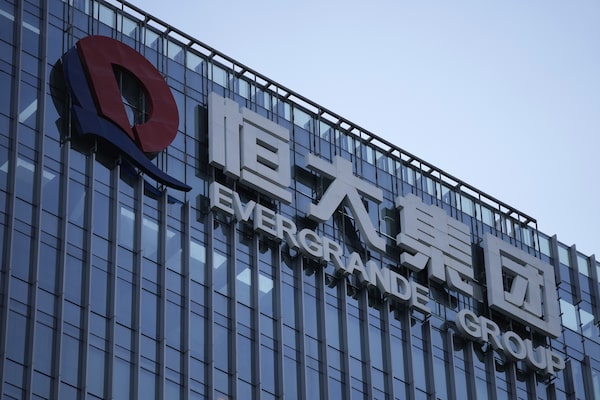
The Evergrande Group headquarters, in Shenzhen, in southern China's Guangdong province, on Sept. 24, 2021.Ng Han Guan/The Associated Press
Trading in shares of China Evergrande Group was suspended on Thursday after a report that its chairman had been placed under police watch, as concerns mounted about the cash-strapped developer’s future amid growing risks of liquidation.
With more than $300-billion in liabilities – roughly the size of Finland’s gross domestic product – Evergrande has become the poster child of the debt crisis in China’s property sector, which accounts for roughly a quarter of the economy.
Trading in the shares of Evergrande and two of its units were suspended on Thursday, a day after Bloomberg reported that its Chairman Hui Ka Yan was taken away by police this month and was being monitored at a designated location.
“It is unclear why Hui is under police surveillance, but it may signal certain negotiations demanded from the government. The latest development has disrupted the hope of restructuring,” said Gary Ng, Asia Pacific senior economist at Natixis.
“No developer is too big to fail in China, and therefore it is hard to imagine a full bailout. Still, when it comes to stability, it is possible to see more government influence in different ways,” Ng added.
The Bloomberg report said it was not clear why Hui was under surveillance and Reuters could not immediately verify the news. Evergrande and the police authorities have not responded to Reuters requests for comment.
Evergrande has been working to get creditors’ approval for restructuring its offshore debt. The process got complicated this week after Evergrande said it was unable to issue new debt due to an investigation into its main China unit.
The offshore debt restructuring plan now looks set to falter and the risks of the company being liquidated are rising, some analysts said.
Reuters reported on Tuesday that a major Evergrande offshore creditor group was planning to join a liquidation court petition filed against the developer if it does not submit a new debt revamp plan by the end of October.
Evergrande’s problems have raised the prospect of an intervention by the Chinese authorities to manage any impact to the financial system and the broader economy, analysts said.
“They’ve managed to avoid the ‘bottom line’ of preventing a systemic crisis caused by one of the developers so far, and will almost certainly intervene further if Evergrande’s situation appears likely to lead to contagion,” said Christopher Beddor, deputy director of China research at Gavekal Dragonomics.
“But apart from that, their approach has often seemed conflicted and at times incoherent, and that continues today.”
Evergrande’s shares ended down 19 per cent on Wednesday in the Hong Kong market, taking their losses to 81 per cent since the resumption of trading in late August after a 17-month suspension.
Evergrande’s latest woes come against the backdrop of Beijing rolling out a raft of measures in the last few weeks, including cutting of existing mortgage rates, to revive the battered property sector.
On Thursday, the finance ministry said China would exempt from taxes urban land used for affordable housing projects starting October. Buyers of such housing, and housing management firms, will also be exempt from stamp duties, the ministry said.
The recent regulatory easing may stabilize the housing market in the world’s second-largest economy to some extent, analysts said, however the appetite for buying property remains subdued in the weak economy.
“Still, the overhang of housing inventories in lower-tier cities facing population decline will persist for several years,” Saxo Greater China Market Strategist Redmond Wong wrote in a research note.
“This will lead to more headlines about defaults, restructuring, and liquidation of insolvent developers, causing losses for shareholders, bondholders, banks, and investors in trust and wealth management products tied to property projects.”